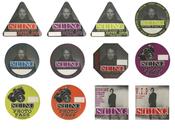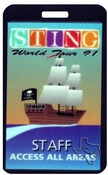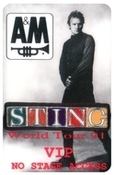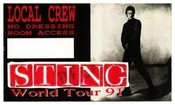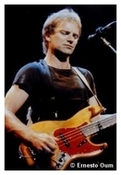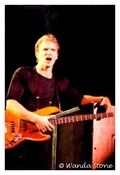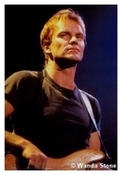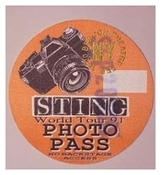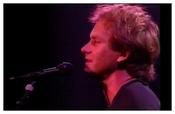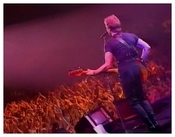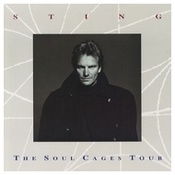
Soul Cages
Aug
24
1991
St. Louis, MO, US
Riverport Amphitheaterwith Special Beat, Vinx
Sting leads his lean ensemble on pop/jazz fusion excursion...
At this point in his career, Sting can pretty much call all the shots.
That was obvious Saturday at the Riverport Amphitheatre when his new, stripped-down touring band followed him through musical excursions that redefined the limits of pop/jazz fusion.
The lean and mean ensemble includes one Sting alumnus, David Sancious on keyboards, as well as two newcomers, British-born Dominic Miller on guitar and Los Angeles session player Vinnie Colaiuta on drums.
It was also great to see Sting back playing the bass, his first and best instrument, for the first time in more than three years. The interplay between band members was outstanding, with Sancious doing a remarkable job covering all the original recorded reed parts with keyboard electronics.
Sting also allowed his vocal muse to run wild with such jazz techniques as scatting. He kept the audience off balance with cover versions of the Bill Withers classic 'Ain't No Sunshine When She's Gone', featuring glowing piano work, and Jimi Hendrix's 'Purple Haze', in which Sancious delivered a blistering guitar solo.
Even new material, such as the achingly beautiful 'Why Should I Cry For You', was altered to make room for a 1991 reading of 'If I Were A Carpenter', complete with 1960s-style organ accompaniment.
Perhaps the best reworking of a tune was the totally jazzed-up version of 'When The World Is Running Down (You Make The Best Of What's Still Around)', which goes back to the early days of the Police. Sting even did the Police one better by bringing out members of the opening act, Special Beat, as well as conga player/vocalist Vinx (who appeared on 'The Soul Cages' and performed for a few minutes just before Sting took the stage), who added a touch more authenticity to the reggae.
Special Beat, made up of members of two British bands, The Specials and English Beat, gave a fresh, exciting overview of ska, a style that was popular in Jamaica before reggae.
(c) The St. Louis Post-Despatch by Louise King
At this point in his career, Sting can pretty much call all the shots.
That was obvious Saturday at the Riverport Amphitheatre when his new, stripped-down touring band followed him through musical excursions that redefined the limits of pop/jazz fusion.
The lean and mean ensemble includes one Sting alumnus, David Sancious on keyboards, as well as two newcomers, British-born Dominic Miller on guitar and Los Angeles session player Vinnie Colaiuta on drums.
It was also great to see Sting back playing the bass, his first and best instrument, for the first time in more than three years. The interplay between band members was outstanding, with Sancious doing a remarkable job covering all the original recorded reed parts with keyboard electronics.
Sting also allowed his vocal muse to run wild with such jazz techniques as scatting. He kept the audience off balance with cover versions of the Bill Withers classic 'Ain't No Sunshine When She's Gone', featuring glowing piano work, and Jimi Hendrix's 'Purple Haze', in which Sancious delivered a blistering guitar solo.
Even new material, such as the achingly beautiful 'Why Should I Cry For You', was altered to make room for a 1991 reading of 'If I Were A Carpenter', complete with 1960s-style organ accompaniment.
Perhaps the best reworking of a tune was the totally jazzed-up version of 'When The World Is Running Down (You Make The Best Of What's Still Around)', which goes back to the early days of the Police. Sting even did the Police one better by bringing out members of the opening act, Special Beat, as well as conga player/vocalist Vinx (who appeared on 'The Soul Cages' and performed for a few minutes just before Sting took the stage), who added a touch more authenticity to the reggae.
Special Beat, made up of members of two British bands, The Specials and English Beat, gave a fresh, exciting overview of ska, a style that was popular in Jamaica before reggae.
(c) The St. Louis Post-Despatch by Louise King

